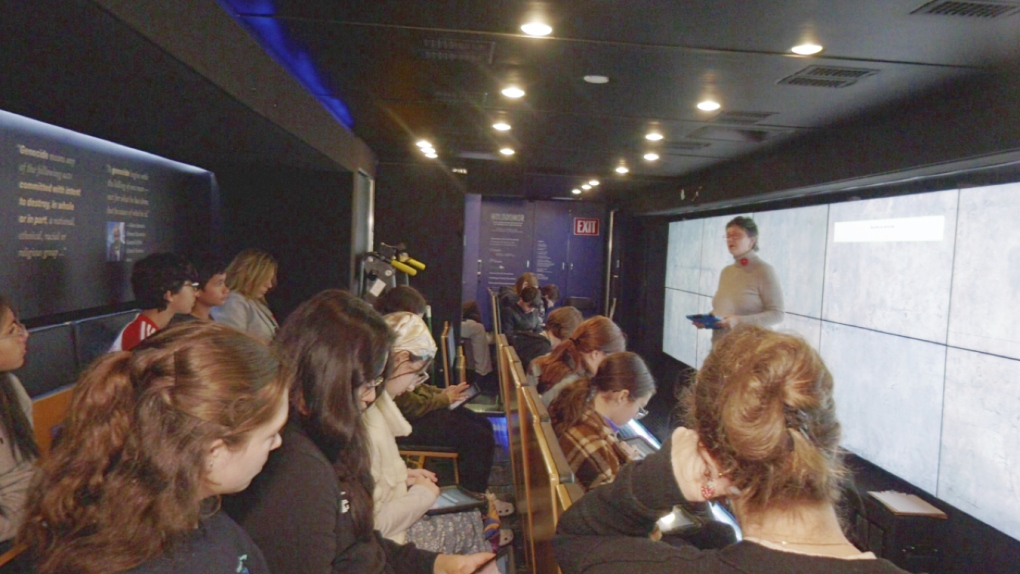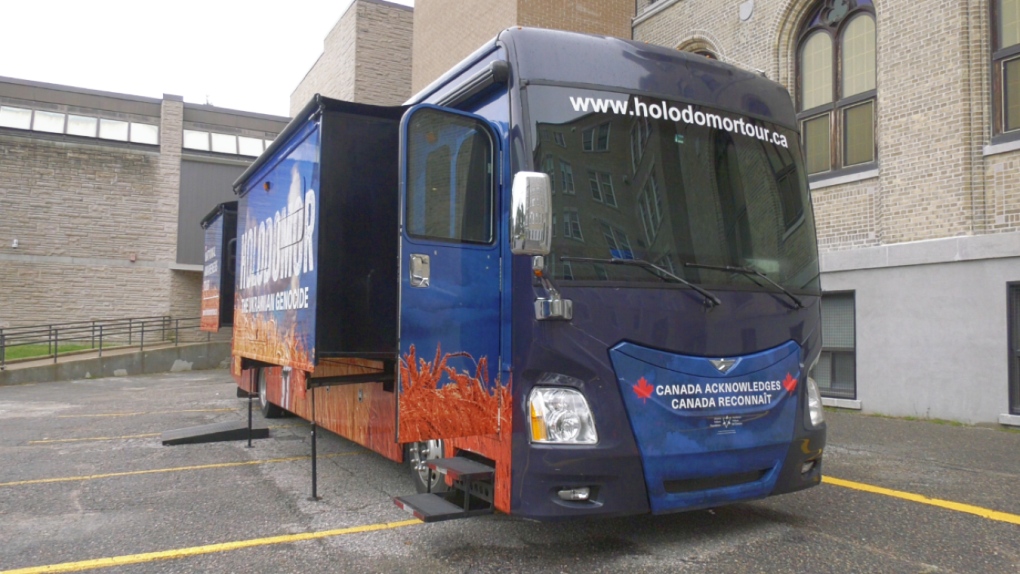Students in North Bay learn about Holodomor genocide in travelling RV exhibit
A travelling exhibit is teaching students in North Bay more about the Holodomor famine, which took place in Eastern Europe more than 90 years ago.
A retrofitted RV with special seats and a digital presentation has been parked at St. Joseph-Scollard Hall Catholic Secondary School in the city for the past few days.
 A retrofitted RV with special seats and a digital presentation has been parked at St. Joseph-Scollard Hall Catholic Secondary School in the city for the past few days. (Eric Taschner/CTV News)
A retrofitted RV with special seats and a digital presentation has been parked at St. Joseph-Scollard Hall Catholic Secondary School in the city for the past few days. (Eric Taschner/CTV News)
It’s called the Holodomor Mobile Classroom and it teaches students about a genocide that killed millions of Ukrainians.
"I really didn’t know anything about it. So, it was a pretty interesting experience," said Katie Sicard, a Grade 12 student at St. Joseph-Scollard Hall.
The retrofitted RV was turned into a mobile display. It travels across the country teaching students about how extreme ideologies enabled mass-scale political repressions through widespread intimidation, arrests and imprisonment.
"The Ukrainians wanted to keep their independence from the Soviet Union," said Roma Dzerowicz, the Holodomor National Awareness Tour’s project manager.
But Soviet leader Joseph Stalin had plans to collectivize agriculture in 1929. A famine was engineered that killed between five million and seven million Ukrainians from 1932-1933.
The Holodomor, which literally translates to 'death by hunger,' was made deadlier by a series of political decrees and decisions aimed mostly at or only at Ukraine.
 A retrofitted RV with special seats and a digital presentation has been parked at St. Joseph-Scollard Hall Catholic Secondary School in the city for the past few days. (Eric Taschner/CTV News)
A retrofitted RV with special seats and a digital presentation has been parked at St. Joseph-Scollard Hall Catholic Secondary School in the city for the past few days. (Eric Taschner/CTV News)
In 1932, the Communist Party set impossibly high quotas for grain that Ukrainian villages were required to contribute to the Soviet state.
A majority of Ukrainians, who were small-scale farmers, resisted. The state confiscated the property of independent farmers and forced them to work on government collective farms.
The more prosperous farmers and those who resisted were branded 'kulaks' (rich peasants) and declared enemies of the state and were to be eliminated as a class.
When the villages were not able to meet the quotas, authorities amped up the requisition campaign, confiscating even the seed set aside for planting and levying fines in meat and potatoes for failure to fulfill the quotas.
Starving farmers
Starving farmers attempted to leave their villages in search of food, but Soviet authorities issued a decree forbidding Ukraine’s peasants from leaving the country.
A law was introduced that made the theft of even a few stalks of grain an act of sabotage punishable by execution.
It’s been described as a genocide by 35 countries, including Canada.
"We learned that a lot of people didn’t believe it was real and that they were trying to hide this," said Rachel Miller, a Grade 8 student at St. Hubert Catholic Elementary School.
The USSR vigorously denied the Holodomor had occurred, and several Western journalists based in the Soviet Union denied the government‘s policies and its brutal enforcement tactics were causing the Ukrainian people to starve.
But as the famine dragged on, journalists such as Gareth Jones and Malcolm Muggeridge risked their careers by exposing the Soviet Union’s coverup.
Last year, the Ontario government introduced new mandatory learning in the Grade 10 Canadian history course about the Holodomor famine and its impact on Canada’s Ukrainian community.
"We’re using it as a stepping stone for democratic rights, civility, tolerance, equity, and most importantly, our human rights values that are being abused," Dzerowicz said.
- Download the CTV News app now
- Get local breaking news alerts
- Daily newsletter with the top local stories emailed to your inbox
The mobile classroom features 60-minute sessions with documentaries on the Holodomor with interactive learning. Dzerowicz says it’s all about empowering today’s youth to use their voices and stand up for what is right.
"We can spread the word and make sure this doesn’t happen again," said St. Hubert Catholic Elementary School Grade 8 student Katie Jackson.
In the hopes of avoiding autocracy and fight for democracy.
"We are trying to move forwards as a society instead of moving backwards," Sicard said.
CTVNews.ca Top Stories

Trudeau's 2024: Did the PM become less popular this year?
Justin Trudeau’s numbers have been relatively steady this calendar year, but they've also been at their worst, according to tracking data from CTV News pollster Nik Nanos.
Manhunt underway after woman, 23, allegedly kidnapped, found alive in river
A woman in her 20s who was possibly abducted by her ex is in hospital after the car she was in plunged into the Richelieu River.
Toronto firefighters rescue man who fell into sinkhole in Yorkville
A man who fell into a sinkhole in Yorkville on a snowy Friday night in Toronto has been rescued after being stuck in the ground for roughly half an hour.
Overheated immigration system needed 'discipline' infusion: minister
An 'overheated' immigration system that admitted record numbers of newcomers to the country has harmed Canada's decades-old consensus on the benefits of immigration, Immigration Minister Marc Miller said, as he reflected on the changes in his department in a year-end interview.
Death toll in attack on Christmas market in Germany rises to 5 and more than 200 injured
Germans on Saturday mourned both the victims and their shaken sense of security after a Saudi doctor intentionally drove into a Christmas market teeming with holiday shoppers, killing at least five people, including a small child, and wounding at least 200 others.
Wild boar hybrid identified near Fort Macleod, Alta.
Acting on information, an investigation by the Municipal District of Willow Creek's Agricultural Services Board (ASB) found a small population of wild boar hybrids being farmed near Fort Macleod.
Summer McIntosh makes guest appearance in 'The Nutcracker'
Summer McIntosh made a splash during her guest appearance in The National Ballet of Canada’s production of 'The Nutcracker.'
22 people die in a crash between a passenger bus and a truck in Brazil
A crash between a passenger bus and a truck early Saturday killed 22 people on a highway in Minas Gerais, a state in southeastern Brazil, officials said.
Back on air: John Vennavally-Rao on reclaiming his career while living with cancer
'In February, there was a time when I thought my career as a TV reporter was over,' CTV News reporter and anchor John Vennavally-Rao writes.

































